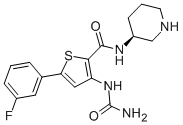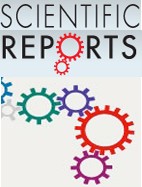All AbMole products are for research use only, cannot be used for human consumption.

AZD7762 is a potent ATP-competitive checkpoint kinase inhibitor with an IC50 of 5 and <10 nM for CHK1 and CHK2 respectively.AZD7762 has been profiled extensively in vitro andin vivo in combination with DNA-damaging agents and has been shown to potentiate response in several different settings where inhibition of checkpoint kinase results in the abrogation of DNA damage-induced cell cycle arrest.

Sci Rep. 2017 Nov 14;7(1):15511.
Targeting a non-oncogene addiction to the ATR/CHK1 axis for the treatment of small cell lung cancer
AZD7762 purchased from AbMole
| Cell Experiment | |
|---|---|
| Cell lines | H29 cells |
| Preparation method | Checkpoint Abrogation Assay HT29 cells (3 × 105) were seeded in 96-well plates and incubated overnight. Cells were treated for 2 h with camptothecin (topoisomerase I inhibitor; 0.07 μg/mL) to induce the G2 checkpoint. Cells were then treated for 20 h with vehicle (0.5% DMSO) or caffeine (4 mmol/L; positive control) plus nocodazole (1 μg/mL) or a 12-point titration of AZD7762 (12.5 μmol/L to 6 nmol/L) plus nocodazole. Nocodazole alone-treated cells with no camptothecin pretreatment were used to determine the maximum mitotic index. Cells were fixed with 3.7% formaldehyde for 1 h, permeabilized with PBS containing 0.05% Triton X, and incubated with anti-phH3 antibody for 1 h followed by Alexa Fluor 488 anti-rabbit (Molecular Probes) and Hoechst stain for 1 h. Mitotic index was determined on the ArrayScan and expressed as the percentage of cells undergoing mitosis. The EC50 was calculated by concentration-response curve fitting using three-variable logistical equations within XLfit (model 205) with the curve bottom constrained to 0 and the top constrained to 100 by nocodazole alone treatment. |
| Concentrations | 6nM~12.5μM |
| Incubation time | 20 h |
| Animal Experiment | |
|---|---|
| Animal models | athymic mice bearing established H460-DNp53 or SW620 tumors and rnu rats bearing established H460-DNp53 tumors |
| Formulation | formulated in 11.3% hydroxyproplyl-β-cyclodextrin |
| Dosages | 25mg/kg(mouse) and 10 or 20mg/kg (rat) |
| Administration | i.v. injection via the tail vein |
| Molecular Weight | 362.42 |
| Formula | C17H19FN4O2S |
| CAS Number | 860352-01-8 |
| Solubility (25°C) | DMSO 50 mg/mL |
| Storage |
Powder -20°C 3 years ; 4°C 2 years In solvent -80°C 6 months ; -20°C 1 month |
| Related Checkpoint Products |
|---|
| PV-1019
PV-1019 (NSC 744039) is a potent, selective Chk2 inhibitor with an IC50 value of 24 nM. PV-1019 inhibits IR-induced apoptosis. |
| CCT241533 dihydrochloride
CCT241533 dihydrochloride is a potent and selective ATP competitive inhibitor of CHK2 with an IC50 of 3 nM and Ki of 1.16 nM. |
| CBP501 Affinity Peptide
CBP501 Affinity Peptide is a Chk kinase inhibitor that can abrogate G2 arrest induced by DNA-damaging agents. |
| Chktide
Chktide is a substrate for CHK1 and CHK2. |
| Zn-DPA-maytansinoid conjugate 1
Zn-DPA-maytansinoid conjugate 1 is a small molecule-based maytansinoid conjugate targeting immune checkpoint. |
All AbMole products are for research use only, cannot be used for human consumption or veterinary use. We do not provide products or services to individuals. Please comply with the intended use and do not use AbMole products for any other purpose.


Products are for research use only. Not for human use. We do not sell to patients.
© Copyright 2010-2024 AbMole BioScience. All Rights Reserved.
